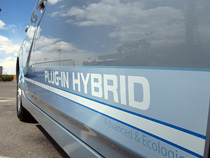EPAct State and Alternative Fuel Provider Fleet Newsletter: Fall 2011
The fall 2011 issue of the EPAct State and Alternative Fuel Provider Fleet Newsletter includes the following articles:
- DOE Issues Guidance on Earning Credits for Acquiring Vehicles
- FleetAtlas Helps Fleets Locate, Analyze, and Manage Information
- DOE Reminds Fleets About Timeline to Request Standard Compliance Exemptions
- Federal EPAct Requirements Overrule State Laws
- Fleets Buy and Sell Credits
- Fleets May Not Apply Banked Credits and Seek Exemptions Jointly
- DOE Offers Annual Reporting Tips
- SFP Program Visits Fleet Managers
- DOE Holds Fuel Retailer Workshop
- Alternative Fueling Station Locator Helps Fleets Find Fuel
- Regulated Fleets Benefit from Connecting with Clean Cities
DOE Issues Guidance on Earning Credits for Acquiring Vehicles
The U.S. Department of Energy (DOE) issued updated guidance on earning credits toward compliance for state and alternative fuel provider fleets that acquire hybrid electric vehicles (HEVs), plug-in hybrid electric vehicles (PHEVs), and low-speed vehicles (LSVs). Through model year 2011, HEVs, PHEVs, and LSVs are not eligible for alternative fuel vehicle (AFV)–acquisition credit under Standard Compliance.1 If DOE decides to allocate credits for HEV, PHEV, and LSV acquisitions,2 credits could apply as early as model year 2012.
HEVs and PHEVs
Presently, to be considered an AFV for earning EPAct compliance credit, electric drive vehicles must be one of the following:

HEVs, PHEVs, and LSVs, are not yet eligible for AFV-acquisition credit under Standard Compliance.
- Electric Motor Vehicles: Powered primarily by an electric motor.
- Dedicated Vehicles: Operates solely on alternative fuel. HEVs or PHEVs that require the use of conventional petroleum fuel are not dedicated vehicles.3
- Dual-Fueled Vehicles: Capable of operating on alternative fuel and on gasoline or diesel fuel, and—in the case of using electricity as a fuel—receives electricity as fuel from an off-board source with the ability to pass a full U.S. Environmental Protection Agency (EPA) urban test cycle and a full EPA highway test cycle on only electricity, as evaluated by the National Highway Traffic Safety Administration.
Low-Speed Vehicles
Low-speed vehicles—including neighborhood electric vehicles (NEVs)—can reach speeds of up to 25 mph. Currently, these vehicles are not eligible for credit because they are non-road vehicles and so not considered motor vehicles under EPAct.
NEVs that a fleet acquires do not count as light-duty vehicle (LDV) acquisitions under Standard Compliance. Nonetheless, NEVs may reduce the fleet's AFV-acquisition requirements if the vehicles replace non-excluded LDV acquisitions that might otherwise serve to increase the annual acquisition requirement. DOE supports and encourages the voluntary use of NEVs because they do not consume petroleum.
More Information
Learn more about the eligibility of electric vehicles and credit for plug-in hybrid electric vehicles under Standard Compliance.
1 10 C.F.R. Part 490
2 Pursuant to section 133 of the Energy Independence and Security Act of 2007
3 10 C.F.R. § 490.2
FleetAtlas Helps Fleets Locate, Analyze, and Manage Information
FleetAtlas is an interactive tool the National Renewable Energy Laboratory (NREL) developed for fleet managers to locate, analyze, and manage fleet information geographically, and to identify opportunities to collaborate with other nearby fleets. Fleets can use this tool to locate fleet garage locations, nearby fleets to collaborate with, and alternative fueling stations—including E85 (85% ethanol, 15% gasoline), compressed natural gas (CNG), electricity, biodiesel, and more.

This online mapping tool helps fleet managers analyze:
- Fleet vehicle counts by vehicle fuel type at garage locations
- Alternative fuel stations within range of fleet garage locations
- Alternative fuel station contacts, access information, and payment methods
- Densities of hybrid, diesel, and flex-fuel vehicles within the general public.
NREL invites fleets not already using FleetAtlas to try the tool, which helps fleet managers compare their information to other fleets that decide to share their vehicle location data, a practice that has helped fleets find other fleets to partner with for funding and installing alternative fuel infrastructure.
To view a demonstration of FleetAtlas, upload your fleet information for your own use, or learn about opportunities to share your fleet data with other managers, contact Ted Sears. Information uploaded to FleetAtlas is confidential and shared only with the fleet's permission. FleetAtlas is available to fleet managers via a secure log-in. Managers must use their own discretion about sharing data with others.
DOE Reminds Fleets About Timeline to Request Standard Compliance Exemptions
Fleets that wish to seek exemptions from Standard Compliance for model year 2011 should submit their exemption requests between September 1, 2011, and January 31, 2012. Exemption requests may be filed only after DOE approves the fleet's annual report.
Find guidance on the exemption process, learn more about the Standard Compliance timeline, and use the Online Exemption Request Tool.
Federal EPAct Requirements Overrule State Laws

When state laws conflict with federal EPAct compliance requirements, federal laws and requirements take precedence. This means that federal laws overrule state executive orders and state laws that contradict federal EPAct requirements. If your state has requirements that conflict with federal requirements, your fleet still must meet federal requirements to comply with EPAct.
Covered fleets that believe state requirements conflict with federal EPAct requirements may want to consider using Alternative Compliance. This option gives fleets more flexibility to use means to comply that may satisfy both EPAct and state requirements.
Fleets Buy and Sell Credits
Covered fleets earn credits for light-duty alternative fuel vehicles they acquire beyond their base AFV-acquisition requirements. After satisfying requirements, fleets also may earn credit for acquiring heavy-duty AFVs.
Credits may be banked for future use or traded. Credit trading is allowed between fleets that need to buy or sell banked credits. Find fleets willing to buy or sell credits on the Credits Bulletin Board.
After you locate a buyer or seller, use the Proof of Credit Transfer form. This form requires the original signatures of the buyer and seller. DOE will notify the buyer and seller if the trade is approved.
Learn more about alternative fuel vehicle credits.
Fleets May Not Apply Banked Credits and Seek Exemptions Jointly
Fleets may not meet vehicle-acquisition requirements by applying banked credits and then seeking exemptions for the same requirements. For example, if you are required to acquire 10 alternative fuel vehicles, you can apply banked credits for 7 and seek exemptions for 3. You cannot, however, apply banked credits for 10 and then seek exemptions for the same 10.
DOE will not grant exemptions to a fleet that has already applied credits to satisfy Standard Compliance for the same vehicle-acquisition requirement. If a fleet submits an exemption request and then decides to apply banked credits, DOE will withdraw the exemption request or reverse exemptions it has granted for that model year.
DOE Offers Annual Reporting Tips
Covered fleets required to comply under the State and Alternative Fuel Provider (SFP) program must file annual reports with DOE by December 31 after each model year. Learn more about covered fleets and compliance methods.
DOE may extend the annual report filing deadline when fleets facing extraordinary circumstances request an extension and provide sufficient justification. To grant your fleet an extension, DOE needs at least the following information:
- Detailed description of the extraordinary circumstances and justification for an extension to file your fleet's annual report
- Notice if your report will include additional (new) fleets and details about those fleets
- Date when your fleet expects to file (no later than January 31 after the relevant model year).
Fleets should request extensions before the annual report filing deadline. DOE will grant extensions only for extraordinary circumstances that are fully justified. To request an extension, email the above information to the SFP program at regulatory.info@nrel.gov.
SFP Program Visits Fleet Managers
Over the past few years, DOE has visited covered fleets to learn about actions they take and methods they practice to comply with SFP program requirements. Learning how fleets apply EPAct requirements in daily operations helps DOE keep the program streamlined and offer an appropriate amount of compliance assistance. These visits help fleet managers comply with EPAct more easily because DOE staff members often are able to clarify requirements and share information about flexible compliance options. DOE sometimes focuses on letting fleets know which compliance options are available for their situation. At other times, DOE provides information about fleet successes and fruitful connections with fuel providers, retailers, and Clean Cities stakeholders.
DOE is always interested in ideas for streamlining the program and helping fleets comply more easily. To participate in these visits and dialogue with DOE at your fleet's site, email the SFP program at regulatory.info@nrel.gov.
DOE Holds Fuel Retailer Workshop
The Fueling Your Bottom Line: E85 Infrastructure Installation Options and Opportunities workshop brings together experts and leaders from DOE, NREL, and the ethanol industry to provide current information on ethanol as a transportation fuel, from production and blending to distribution and deployment. The first workshop was held February 3, 2011, in Garden Grove, California. This workshop benefited from a partnership with Propel Fuels, helped fuel retailers learn about ethanol as a fuel, and expanded the network of interested retailers by several hundred. Additional fuel retailer workshops will be held in 2011.
Learn more about the E85 infrastructure workshop.
Alternative Fueling Station Locator Helps Fleets Find Fuel

The Alternative Fueling Station Locator helps fleet managers and fleet personnel find alternative fueling stations in their area. This tool was developed by the National Renewable Energy Laboratory for the Alternative Fuels Data Center.
Regulated Fleets Benefit from Connecting with Clean Cities
Clean Cities Now features stories about fleets that have experienced success with using alternative fuels and vehicles and with implementing fuel-saving measures in their operations. This biannual newsletter includes articles about online tools for fleets, Clean Cities accomplishments, and emerging fuels and vehicle technologies. Read the Clean Cities Now newsletter and subscribe on the Clean Cities website.
If you are looking to partner on an alternative fuel infrastructure project, Clean Cities can help. Learn about Clean Cities' mission and accomplishments in the What Is Clean Cities? fact sheet and find contact information for nearly 100 coalitions across the country. Just like regulated fleets, Clean Cities coalitions are located in non-attainment areas, so you should find a coalition near you.
